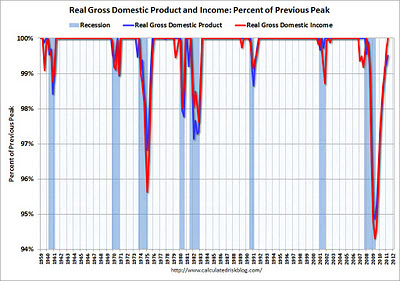How're we doing (Oct 2011 Edition)?

The economy is still in a funk, way below its most 2008 peak. Look at Personal Income, with the effect of prices taken out (i.e. "real" personal income). The great Calculated Risk blog has a chart showing these values relative to the most recent "peak". This gives us a normalized view of how much Incomes are dipping. By this measure, we see a 5% dip, unprecedented since the Great Depression (pre-1960 not shown). However, we have fully rebounded now -- at least by this one measure. One problem with this measure is that it includes " transfer payments ". Since a government can borrow to pay welfare, let's subtract these payments and see what that looks like. ( Click here for original chart ) This second chart excludes transfer payments, and shows: a larger (10%) dip we have not fully rebounded By this measure, we are half-way back to the peak. If we extrapolate the line upward, we'll probably be back to peak in 3 years or so...
